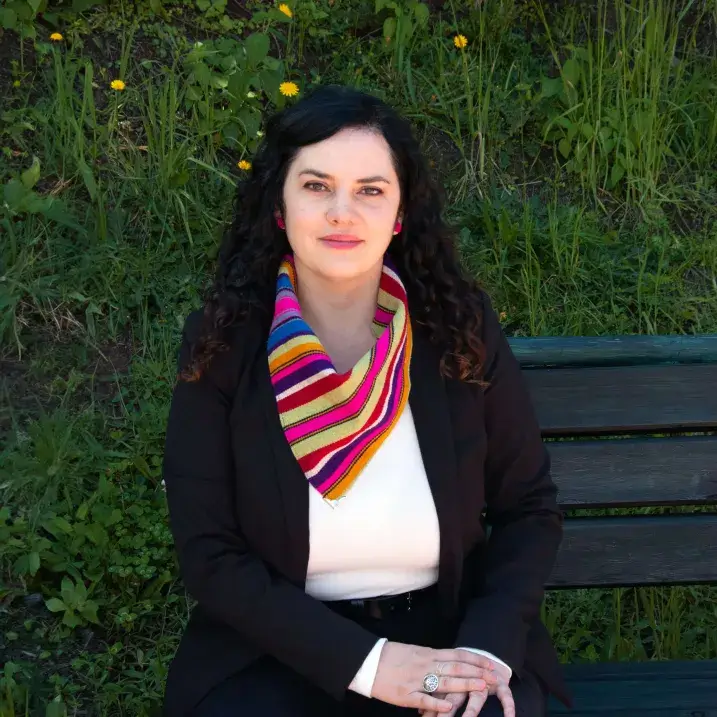- PhD in Food Systems, University of Vermont, United States
- Master’s in Leadership for Sustainability, University of Vermont, United States
- Master’s Degree in International Development and Cooperation, Valencia University
- Graduate Certificate in Public Policy, Australian National University, Australia
- Specialization in Climate Change and Cities, FLACSO, Ecuador
- Certificate in Urban Agriculture, Harris-Stowe University, United States
- Bachelor’s Degree in Law, International SEK University, Ecuador
Areas of expertise
Agroecology, Collective Action, Food Systems, Indigenous Knowledge Systems, Planetary health, Nature and health
BIO
Amaya Carrasco-Torrontegui is a researcher and practitioner in agroecology, climate resilience, food sovereignty, and community health. She holds a Ph.D. in Food Systems from the University of Vermont and has 20+ years of experience across government, academia, and grassroots organizations.
Amaya has worked for the Ecuadorian government, including the Ministry of Environment and the Municipality of Quito, leading initiatives on climate change, development, and policy evaluation. She has also collaborated with nonprofits, supporting communities in Ecuador, India, Spain, Australia, and the U.S.
She specializes in participatory and transdisciplinary research at the intersection of agroecological transitions, planetary health, and food systems. At the UVM Institute for Agroecology, she co-coordinates the Agroecology and Planetary Health Research Program and co-leads the Agroecology Support Team in the Andean Region, a McKnight Foundation-funded initiative. She also directs the Caliata Initiative, a community-driven effort to revitalize rural Andean communities.
She is the principal investigator who studies how traditional Andean agroecological spaces influence mental health amid displacement and urban migration. Working with 54 Kichwa participants in Ecuador’s Chimborazo Province, her research uses cardiac coherence measurements and interviews to compare well-being in traditional and urban settings. This work advances Indigenous contemplative science.
An active Nature and Health Alliance member, Amaya integrates nature’s health benefits into research, bridging ecological sustainability and human well-being.
Awards and Achievements
- US Women Food Agriculture Network: “Recognition as an Extraordinary Community Builder in Farm and Food Justice 2021”
- Rubenstain School for the Environment and Natural Resources at the University of Vermont: “Graduate Senate Award for Outstanding Master Research and Scholarship 2021.”
- Harris-Stowe University: “Provost’s Academic Honor’s Certificate 2018” Certification in Urban Agriculture.
Bio
Amaya Carrasco-Torrontegui is a researcher and practitioner in agroecology, climate resilience, food sovereignty, and community health. She holds a Ph.D. in Food Systems from the University of Vermont and has 20+ years of experience across government, academia, and grassroots organizations.
Amaya has worked for the Ecuadorian government, including the Ministry of Environment and the Municipality of Quito, leading initiatives on climate change, development, and policy evaluation. She has also collaborated with nonprofits, supporting communities in Ecuador, India, Spain, Australia, and the U.S.
She specializes in participatory and transdisciplinary research at the intersection of agroecological transitions, planetary health, and food systems. At the UVM Institute for Agroecology, she co-coordinates the Agroecology and Planetary Health Research Program and co-leads the Agroecology Support Team in the Andean Region, a McKnight Foundation-funded initiative. She also directs the Caliata Initiative, a community-driven effort to revitalize rural Andean communities.
She is the principal investigator who studies how traditional Andean agroecological spaces influence mental health amid displacement and urban migration. Working with 54 Kichwa participants in Ecuador’s Chimborazo Province, her research uses cardiac coherence measurements and interviews to compare well-being in traditional and urban settings. This work advances Indigenous contemplative science.
An active Nature and Health Alliance member, Amaya integrates nature’s health benefits into research, bridging ecological sustainability and human well-being.
Awards and Achievements
- US Women Food Agriculture Network: “Recognition as an Extraordinary Community Builder in Farm and Food Justice 2021”
- Rubenstain School for the Environment and Natural Resources at the University of Vermont: “Graduate Senate Award for Outstanding Master Research and Scholarship 2021.”
- Harris-Stowe University: “Provost’s Academic Honor’s Certificate 2018” Certification in Urban Agriculture.
